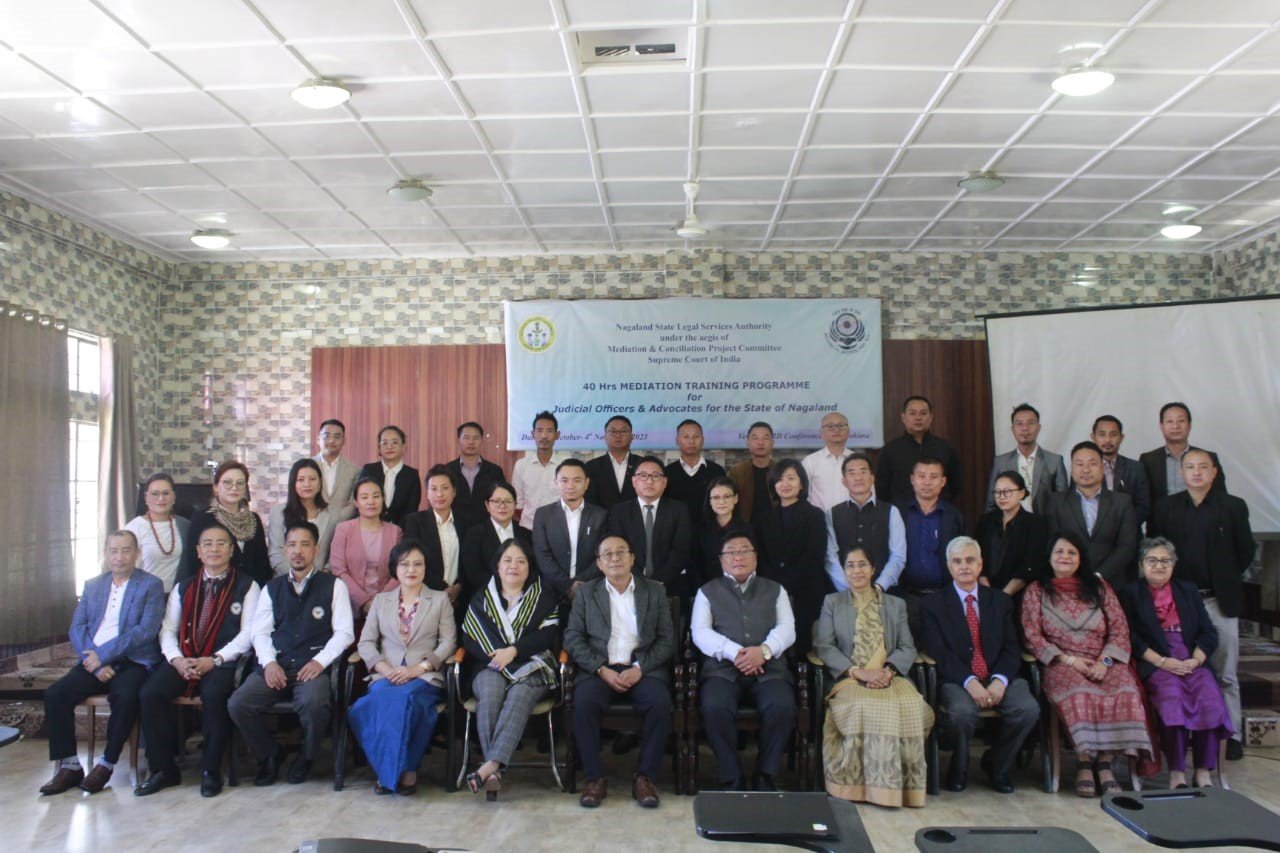The inaugural programme of the 40 Hours Mediation Training Programme for Judicial Officers and Advocates of the State of Nagaland began on October 31 in Kohima. The training is being organised by Nagaland State Legal Services Authority under the aegis of Mediation and Conciliation Project Committee (MCPC), Supreme Court of India.
Justice Lanusungkum Jamir, Judge, Gauhati High Court and Executive Chairman, Nagaland State Legal Services Authority, in his inaugural address, said that mediation training serves as an inspiration for the legal system at large to promote the rule of law and for efficient use of alternate dispute resolution mechanism in the best method.
“The Indian Judicial system is not only unique because it is a written constitution but also because people repose immense faith in it. However, the same is a complex structure,” said Judge Lanusungkum. Therefore, to provide for the poor and needy people who approach law courts to steadily redress their grievances steadily, the Judge pointed that mediation training serves as an inspiration for the legal system at large to promote the rule of law and for efficient use of alternate dispute resolution mechanism in the best method.
Jamir highlighted that private mediation that take place at a pre litigation stage are also becoming more prevalent in the country and traditionally, mediation system is a facilitative process where the mediator play the role as a facilitator within parties.
However with more conflicts and sophisticated problems, the mediators are being asked to provide more active assistance to the parties to reach a negotiation. Therefore, there requirement for active standards and neutrality of mediators has become the need of the hour.
“The beauty of Mediation lies in bringing about a solution which may not only be to the satisfaction of the parties acceptable to law but also solves the problem of delay and further contributes towards economic, financial and commercial growth and development of the society,” Jamir further added.
He urged all the participants to make full use of the training to emulate the advantages of mediation crucial in the judicial system.
TN Manen, IAS (Retd.), Advisor Law & Justice and Law Revenue, Government of Nagaland, said that the State government has been making endeavours to streamline the customary system of law in Nagaland as recognised under special provision of Article 371 (A) for the state. “It not only has historical significance but has been present since time immemorial,” said the Advisor who further commented that without streamlining or modifying it to cater to the needs of the changing times, it will loose its significance.
While observing that the State has been embroiled in one or the other issue over a century, the Advisor lamented that the supremacy of law is yet to be fully established in Nagaland.
“There is no absolute right or absolute wrong and therefore, mediation which is conciliatory in nature, should be appreciated. Solutions should be accepted by parties through mediators who act as an impartial party,” asserted Manen.
The Advisor also added that the purpose of law was to mitigate any sense of injustice, not through force but through mutual understanding and mediation which is one of its kind is also accepted as important worldwide.
Mezivolu T Therieh, OSD Registrar and Member Secretary, MCPC, Supreme Court of India opined that mediation, as an alternative to traditional litigation, is not only gaining widespread acceptance but demonstrating its efficacy and cost-effectiveness as a well established dispute resolution mechanism.
Therie, in this regard, observed that the success of mediation hinges on two critical factors including the willingness of the parties to and the skill of the mediator in guiding the parties to a point where an agreement is attainable.
The mediator’s role, therefore, she said is to facilitate the identification and clarification of issues, foster communication, explore options for resolution, and assist the parties in reaching a mutually acceptable agreement.
Download Nagaland Tribune app on Google Play

The Secretary of MCPC therefore remarked that it was imperative that they are well-trained, knowledgeable in their field, impartial, creative, and efficient. The mediator should be apt at fostering a creative problem-solving environment and promoting trust and confidentiality, she added. Providing a background of MCPC, Therie said that MCPC came into existence in 2005 and the mediation act was in place. “We are, as a dispute resolution system, moving towards early detection of disputes to facilitate early resolution,” she said.
Earlier, NSLSA Member Secretary, Victo Sema, NJS delivered the welcome address and Apila Sangtam, Panel Lawyer chaired the programme. The theme song of the NSLSA was presented by Kohima DSLA.
The 40-Hours Mediation Training is being held from October 31- November 4 with Nagaland Judicial officers and Advocates.
The training is being conducted by trainers including Dr Aditi Chaudhury, District Judge and Director Delhi Judicial Academy; Nagina Jain, Advocate, Mediator Trainer, Delhi High Court; Harish Dudani, Principal Judge (Rtd) Delhi and Jaya Goyal, Advocate Mediator Trainer, Delhi High Court.

